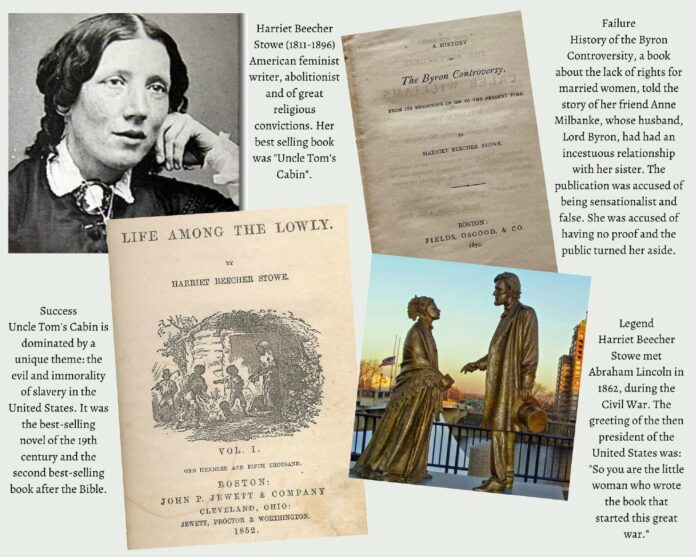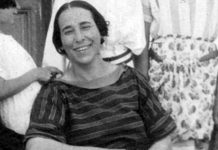Introduction
Harriet Beecher Stowe was a 19th century American writer who had a major influence on the literature of her country. Harriet left a legacy on American literature through her commitment to abolitionism, her focus on pedagogical and moralizing writing, and her advocacy for women’s rights. Her most famous work, «Uncle Tom’s Cabin,» continues to be studied and discussed today.
Nationality
American
Historical birthplace (s) / Point out the several geographical area(s) that she lived.
Harriet Beecher Stowe was born on June 14, 1811 in Litchfield (Connecticut).
She studied in Hartford (Connecticut), and later moved with her family to Cincinnati (Ohio). After his marriage he moved to Brunswick, Maine. After the Civil War they bought a house in Mandarin (Florida).
Religion / Ideology
At the beginning he followed his family’s religious beliefs (orthodox Calvinism) and later his spirituality became Anglican.
Marital Status- single or married (marriage(s), children)
In 1836 she married Calvin Stowe and they had seven children:
Charles Edward Stowe, Georgiana May, Frederick William, Samuel Charles, Harriet Beecher, Henry Ellis and Eliza Tyler.
Education Beecher’s Hartford Female Seminary /other
When she was a little girl she became a literary promise by winning a school writing contest. She began her education at Sarah Pierce’s academy (where girls were supported to study academic subjects). She later became a student and then a teacher at Hartford Female Seminary.
What is racism? Your points of view about it/ Examples
Racism is an ideology that defends the superiority of one ethnic group over others and justifies their economic exploitation, social segregation or physical destruction. According to UNHCR, there are several types of racism:
- Aversive racism: showing distance from another person, lacking empathy or showing coldness.
- Ethnocentric racism: rejecting customs, beliefs, behaviors, religions or languages of other ethnic groups.
- Biological racism: believing that members of other races should not have any rights and should be totally excluded and even physically segregated.
Famous Anecdotes about Harriet Beecher Stowe and President Abraham Lincoln
Abraham Lincoln met Harriet Beecher Stowe in 1862, confessing his pleasure in meeting her with the following phrase: «So you’re the little woman who wrote the book that started this great war!» This conflict ended with the victory of the northern states and the abolition of slavery.
How can you consider H.B. Stowe? Was she a brave woman or a woman of faith?
I personally consider her both: she was a woman of consistency and unwavering faith, whose courage was based on the sacrifice of fostering love and compassion for our fellow human beings above any hatred.
What was The Fugitive Slave Law in 1850? What is / are your point(s) of view about it nowadays?
This rule required that all escaped slaves who were captured must be returned to their enslavers and that the authorities and citizens of the free states had an obligation to cooperate in their apprehension. Abolitionists dubbed it the «Hound Law,» after the dogs that were used to track down runaway slaves.
The passage of this law contributed to the growing polarization of the United States over the issue of slavery, and is considered one of the causes of the Civil War. It is arguably the most hated piece of federal legislation in the nation’s history.
Cultural Influences of Uncle Tom´s Cabin in the Annals of the American History
Although the play was born as a social denouncement against slavery, from that moment on it had an infinite number of sectors for and against it:
- It was censured for its accentuatedly Christian character, which went so far as to turn «Uncle Tom» into a martyr for forgiving his murderers.
- Collectives such as the «Black Panthers» did not understand the insufferable resignation of characters who were not capable of arming themselves and fighting oppression.
- The expression «Uncle Tom» became an insult to refer to cowardly people who did not dare to confront injustice.
Family Bonds:
- Lymann Beecher: Father: preacher.
- Catherine Beecher: Older sister: had great influence on Harriet.
- Harriet Beecher Stowe: Protagonist of the work: abolitionist writer.
- Carlos Beecher: Brother: preacher and composer of religious hymns.
- Isabela Beecher Hooker: Step-sister: founder of the National Women’s Suffrage Association.
- Calvin Stowe: Husband: professor of languages and biblical literature.
Uncle Tom´s Cabin Plot / Main themes/ Main and Secondary themes / Your points of view
The main theme of this book is slavery, it tells the story of Uncle Tom who works (along with his family) on a property and is sold to a slave trader.
It is evident that the author also emphasizes other situations: wickedness and immorality, the moral authority of motherhood, the separation of families, possible repentance, and the possibility of being sold into slavery.
Uncle Tom´s Cabin Contributions on the Cinematography Industry / Theatrical Representation
Versions of the book Uncle Tom’s Cabin in the motion picture industry:
1903 Director: Edwin S. Porter Country: United States Running time: 13 min.
1914 Director: William Robert Daly Country: United States Duration: 54 min.
1927 Director: Harry A. Pollard Country: United States Running time: 144 min.
1937 Director: Tex Avery Country: United States Runtime: 9 min. Animation
1947 Director Tex Avery Country: United States Runtime: 8 min. Animation
1965 Director: Géza von Radványi Country: Germany Duration: 118 min.
The theatrical representations became shows that used caricatures and stereotypes of black people, thus inverting the intention of the novel. Some of the adaptations became mockery in favor of slavery.
Main Questions:
What is /are your point(s) of view on the figure of Harriet Beecher Stowe?
In my opinion there are different reasons to consider Harriet Beecher Stowe as an important figure :
Abolitionism: Through her work «Uncle Tom’s Cabin,» Stowe contributed to raising awareness about slavery.
Pedagogical writing: Stowe’s work is also notable for its pedagogical and moralizing approach, through which she sought to influence society and promote social change
Feminism: In addition to her abolitionist activism, Stowe was also an advocate for women’s rights and is considered an important figure in the feminist movement.
Can we consider her as abolitionist or feminist? Was she against social classes?
I consider her both, it is clear that in her emblematic work her goal is the abolition of slavery, but she also highlights «motherhood as an ethical and structural model of American life», «women are the ones who can save families, fight against injustice…». She was a precursor of feminist demands, thus paving the way for the increase of women’s rights.
It was in 1850, due to the slave laws and more specifically against fugitive slaves that she became sensitized to a social reality that she considered totally unjust. She wrote to the editor of «The National Era», a publication that openly advocated the abolition of slavery.
What do you think is the main contribution of Harriet Beecher Stowe to the abolitionism movement?
To make known to the entire American society that there were about three million slaves, and that it was not a problem only of the Southern states. The book «Uncle Tom’s Cabin» is believed to have had a great influence as it may have been the trigger for the beginning of the Civil War.
Which are the most similar and different aspects between Harriet Beecher and Harriet Tubman?
Harriet Tubman was an African American slave, led combat troops, found the cure for dysentery, belonged to the Underground Railroad organization, her code name being «Moses»… It is evident that her life has nothing to do with that of Harriet Becher Stowe, although they were united by the struggle in favor of the abolitionist movement, each one did it from different sectors of society. The first one putting her life in danger every day, the second one trying to reach the American society through literature.
Were Harriet Beecher Stowe and Harriet Tubman members of the Underground Railroad?
The Underground Railroad was an underground organization founded by Quakers that helped several thousand slaves escape from their masters and reach the North, where they would live in freedom.
People known as «conductors» guided the runaway slaves. The hiding places included private homes, churches and schools. These were called «stations,» «safe houses,» and «depots.» The people who operated them were called «stationmasters.»
Harriet Tubman (born a slave and whose real name was Araminta Ross) was the most famous conductor on the Underground Railroad. Harriet Beecher Stowe when residing in a southern state (Cincinatti) was witness of the attempt of escape of a slave… and she used that event to reflect it in a chapter of the book «Uncle Tom’s Cabin».
What do you think? Comparison (differences) with one of these writers: + Agatha Christie + Virginia Woolf + other writer chosen by the student
Agatha Christie and Harriet Beecher Stowe are two well-known writers in the history of literature, but they differ in several aspects:
Literary genre: Agatha Christie is known for her mystery and suspense novels, while Harriet. Beecher Stowe excelled in writing social and whistleblower novels.
Historical context: Agatha Christie lived in the 20th century, while Harriet Beecher Stowe was a 19th century author.
Influence and legacy: Agatha Christie laid the foundations of the modern detective novel and is considered one of the most influential writers in the genre.
On the other hand, Harriet Beecher Stowe had a significant impact on the fight against slavery in the United States.
Virginia Wolf (British), like Harriet Beecher Stowe (American), were writers, advocates of gender equality, questioned certain social norms and demanded women’s rights. The great difference between the two is that the former was an agnostic and atheist, while the latter’s religious beliefs were always present throughout her life.
Virginia Wolf had amorous experiences with women, being able to say, according to her letters and novels, that her sexual orientation was bisexuality. She suffered from «bipolar disorder» and committed suicide by throwing herself from a bridge with her coat pockets full of stones.
Louisa May Alcott and Harriet Beecher Stowe were two prominent American writers of the 19th century, but there were some key differences between them:
Themes and literary genres: Alcott is best known for her semi-autobiographical novel «Little Women» (1868) in which themes such as femininity, family and personal growth are discussed.
On the other hand, Stowe is famous for her influential novel «Uncle Tom’s Cabin» (1852), which played an important role in the fight against slavery.
Personal experiences: Alcott grew up in a family of thinkers and reformers, while Stowe experienced the loss of her mother at an early age and was raised in a strict religious environment.
Activism: While both writers were committed to social causes, Stowe became a leading figure in the abolitionist movement, while Alcott focused more on the struggle for women’s rights and suffrage.
Razón: La profesora Ruth A. Cotto, del grado en periodismo semipresencial, solicita a su alumnado un análisis e interpretación de la vida y obra de Harriet Beecher Stowe. El desarrollo de esta actividad corresponde al Ciclo de Innovación y Creatividad de la asignatura de Inglés II. El trabajo está compuesto de dos partes: una tabla para ser completada y un collage explicativo. Ambas partes se complementan. El collage se basa en cuatro momentos difíciles o importantes a los que Harriet Beecher Stowe se enfrentó en su vida.
Temática: Es notable señalar que este trabajo está basado en una de las figuras literarias más importantes de Norteamérica. La figura de Harriet Beecher Stowe es el sentido común llevado a la literatura. El amor, la justicia y la bondad basadas en dicho sentido común son la estructura espiritual en las obras de Harriet Beecher Stowe; como por ejemplo la obra literaria: Uncle´s Tom Cabin.
Alumnos: Pablo Santiago Ballester Mañeru.
Curso: 2023-2024.
Asignatura: Inglés II.

















































